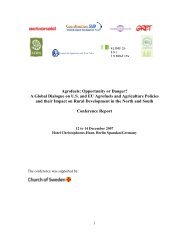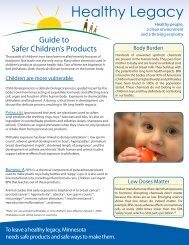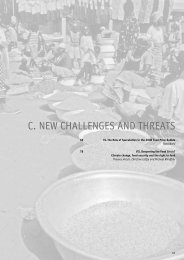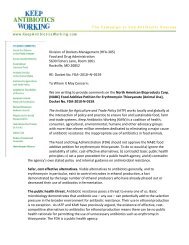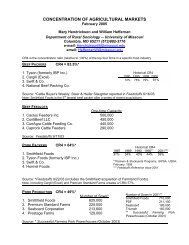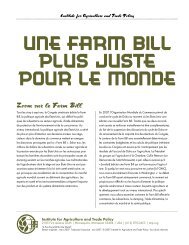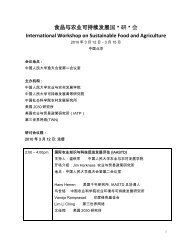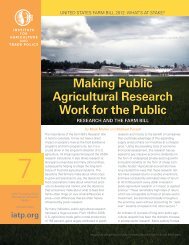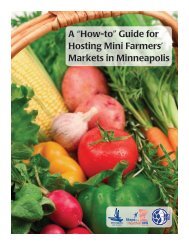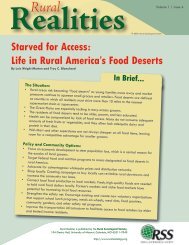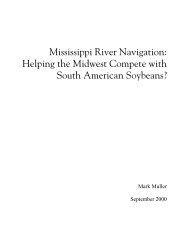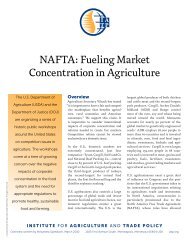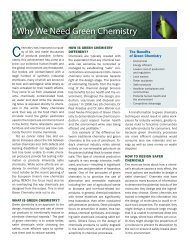IATP Hog Report - Institute for Agriculture and Trade Policy
IATP Hog Report - Institute for Agriculture and Trade Policy
IATP Hog Report - Institute for Agriculture and Trade Policy
You also want an ePaper? Increase the reach of your titles
YUMPU automatically turns print PDFs into web optimized ePapers that Google loves.
Section 6<br />
Ironically, the creation of legal exemptions <strong>for</strong> acts specifically toward<br />
farm animals is a tacit admission that, prior to the exemptions, the acts<br />
were considered cruel under the law <strong>and</strong> thus would have been criminal<br />
offenses. Elected representatives thus are creating a legally protected<br />
sphere wherein any act, if it is viewed as customary by agribusiness, is not<br />
to be found cruel <strong>and</strong> any future practice, if it becomes customary, is<br />
allowed no matter how horrific it is. 108<br />
These laws excuse factory farms from ethical animal production practices.<br />
By exempting livestock agriculture from liability <strong>for</strong> practices that would<br />
be construed to be cruel were they to be done to any non-agricultural<br />
animal, such as deprivation of movement, social interactions, light, <strong>and</strong><br />
other quality of life factors, these laws give factory farms a major<br />
competitive advantage over farms that do not engage in these practices.<br />
They also eliminate a potentially effective tool with which citizen groups<br />
could have effectively opposed the establishing of animal factories.<br />
Farmers who treat their animals with respect <strong>for</strong> their natures are<br />
internalizing the costs of providing a humane environment <strong>for</strong> them.<br />
Animal factories externalize those costs by evading that responsibility.<br />
The first to bear these externalized costs are the animals, but the costs of<br />
the failure to farm in ways that respect the welfare of farm animals extend<br />
beyond the boundary of the farm. Everyone ultimately bears the costs of<br />
the reduced effectiveness of antibiotics. Taxpayers <strong>and</strong> natural resource<br />
users bear the costs of soil <strong>and</strong> water pollution by liquid manure spills.<br />
Future generations will bear the costs of global warming <strong>and</strong> depleted<br />
resources.<br />
Conclusions<br />
http://www.iatp.org/hogreport/sec6.html (18 of 30)2/27/2006 3:50:16 AM<br />
Until production systems meet the species-specific needs of farm animals,<br />
we are farming beyond their ability to adapt. 109 Ultimately, ignoring the<br />
welfare of production animals makes animal agriculture unsustainable.<br />
Polls have revealed that the American public cares about how farm<br />
animals are raised. 110,111 Some already pay more <strong>for</strong> meat <strong>and</strong> other<br />
products from animals raised respectfully. 112 However, many, possibly<br />
most, consumers remain ignorant of the hostile conditions <strong>for</strong> animals<br />
inside animal factories.<br />
Understood as a basic biological <strong>and</strong> ecological issue influencing<br />
sustainability, food safety, environmental quality, <strong>and</strong> the preservation of a<br />
viable independent family farm structure of agriculture, animal welfare is<br />
a factory-farm issue around which farmers can be mobilized. As an ethical<br />
<strong>and</strong> public health issue, it is a factory-farm issue around which consumers



